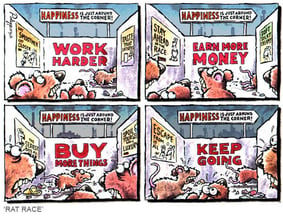There are some strengths that sound like an advantage but in reality, should raise a red flag when brought up in a  job interview. Examples include “I’m a perfectionist,” or “I can multitask.”
job interview. Examples include “I’m a perfectionist,” or “I can multitask.”
We recommend adding one more to the list: “I’m a workaholic.”
When we collected data from 1,385 people who took the Type A Personality Test, we focused our attention on self-proclaimed workaholics. When a job candidate proudly professes that he or she is a “workaholic,” there is more to this response than employers may realize.
On the one hand, workaholics are dedicated and determined, and probably get more done than the average person. Unfortunately, they’re also more likely to find that their social life as well as their mental and physical health suffer as a result.
Here are some statistics revealed by our study:
- 86% of workaholics push themselves to accomplish their goals.
- 65% take work home with them.
- 63% hate the idea of being considered an average performer.
- 62% feel uneasy when they’re not doing something productive.
- 52% eat on the run.
- 76% of workaholics consider it essential to have a job position that is well-respected.
You might be thinking: “So what’s the problem … it may not be politically correct, but this is exactly the kind of person I want working for my company.”
We beg to differ. Why? Well, workoholism has a downside, and it happens to outweigh the pros:
- 46% find that their life is too stressful.
- 73% have trouble unwinding at the end of the day.
- 56% feel over-worked.
- 64% feel like they don’t have enough time to accomplish their goals.
- 73% get angry at themselves when they don’t finish everything they wanted to do.
- 68% said that they can’t tolerate people who slow them down.
- 68% compare themselves to others.
- 67% feel like they’re constantly rushing to get somewhere.
- 63% would rather deal with problems on their own than ask others for help.
- 60% tend to be over competitive.
- 60% are impatient.
- 58% feel tense.
- 49% have trouble falling asleep.
- 47% overbook themselves.
It’s important that we make something clear: Working overtime or taking work home is fine every once in a while. The problem lies with those who do this on a consistent basis. This means that while your workaholic employee may very well break records and earn Employee of the Month or other accolades, working at this pace comes at a personal, professional, and physical cost.
Workaholics have little time for family and friends; their support network is either non-existent, or very limited. They have neither the time nor the patience for hobbies and relaxation. They don’t have time to spend in nature, no time to play, no time to let their hair down and just have fun. Their mind is always racing, and they consider sleep to be a waste of time. If they do exercise, they approach it as yet another task. They will continue to work furiously towards a goal that will probably only be achieved in the distant future.
The result? The stress and constant pressure to perform well in absolutely everything results in a build-up of fatigue, resentment and frustration. Workaholics’ adrenaline-fueled creativity runs dry, since they are just too sleep-deprived. They start snapping at their coworkers. They take it out on their direct reports. People hate working with them or for them. They fail to deliver on time because there are simply not enough hours in the day to cater to their overbooked schedule.
At some point, the workaholic’s mind and body will say “That’s enough.” This could mean ending up on sick leave from a massive burnout, or other stress-related health problems. This leaves both the employee and the company at a serious disadvantage.
Top performers value more than hard work and financial compensation, and our research has shown this time and again. Remember, your employees should work to live, not live to work.
If you’re interested in using the Type A Personality Test, or other tests for HR purposes, request a free trial for ARCH Profile here.Want to learn more about using psychological tests for hiring, leadership development, career development or talent retention? Download our free eBook loaded with down-to-earth information about psychological testing for HR purposes.Ready for a test drive of ARCH Profile, the delivery system for PsychTests’ assessments? All you need to do is ask!


